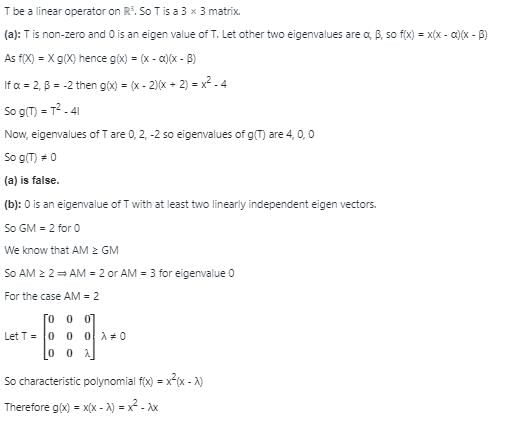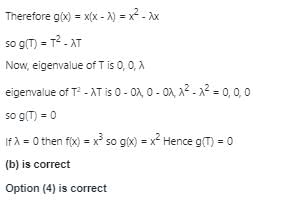Mathematics Exam > Mathematics Questions > Let T be a linear operator on 3. Let f(X) &is...
Start Learning for Free
Let T be a linear operator on ℝ3. Let f(X) ∈ ℝ[X] denote its characteristic polynomial. Consider the following statements.
(a). Suppose T is non-zero and 0 is an eigen value of T. If we write f(X) = X g(X) in ℝ[X], then the linear operator g(T) is zero.
(b). Suppose 0 is an eigenvalue of T with at least two linearly independent eigen vectors. If we write f(X) = X g(X) in ℝ[X], then the linear operator g(T) is zero.
- a)Both (a) and (b) are true.
- b)Both (a) and (b) are false
- c)(a) is true and (b) is false.
- d)(a) is false and (b) is true.
Correct answer is option 'D'. Can you explain this answer?
Verified Answer
Let T be a linear operator on 3. Let f(X) ∈ [X] denote its charac...



|
Explore Courses for Mathematics exam
|

|
Similar Mathematics Doubts
Question Description
Let T be a linear operator on 3. Let f(X) ∈ [X] denote its characteristic polynomial. Consider the following statements.(a). Suppose T is non-zero and 0 is an eigen value of T. If we write f(X) = X g(X) in [X], then the linear operator g(T) is zero.(b). Suppose 0 is an eigenvalue of T with at least two linearly independent eigen vectors. If we write f(X) = X g(X) in [X], then the linear operator g(T) is zero.a)Both (a) and (b) are true.b)Both (a) and (b) are falsec)(a) is true and (b) is false.d)(a) is false and (b) is true.Correct answer is option 'D'. Can you explain this answer? for Mathematics 2025 is part of Mathematics preparation. The Question and answers have been prepared according to the Mathematics exam syllabus. Information about Let T be a linear operator on 3. Let f(X) ∈ [X] denote its characteristic polynomial. Consider the following statements.(a). Suppose T is non-zero and 0 is an eigen value of T. If we write f(X) = X g(X) in [X], then the linear operator g(T) is zero.(b). Suppose 0 is an eigenvalue of T with at least two linearly independent eigen vectors. If we write f(X) = X g(X) in [X], then the linear operator g(T) is zero.a)Both (a) and (b) are true.b)Both (a) and (b) are falsec)(a) is true and (b) is false.d)(a) is false and (b) is true.Correct answer is option 'D'. Can you explain this answer? covers all topics & solutions for Mathematics 2025 Exam. Find important definitions, questions, meanings, examples, exercises and tests below for Let T be a linear operator on 3. Let f(X) ∈ [X] denote its characteristic polynomial. Consider the following statements.(a). Suppose T is non-zero and 0 is an eigen value of T. If we write f(X) = X g(X) in [X], then the linear operator g(T) is zero.(b). Suppose 0 is an eigenvalue of T with at least two linearly independent eigen vectors. If we write f(X) = X g(X) in [X], then the linear operator g(T) is zero.a)Both (a) and (b) are true.b)Both (a) and (b) are falsec)(a) is true and (b) is false.d)(a) is false and (b) is true.Correct answer is option 'D'. Can you explain this answer?.
Let T be a linear operator on 3. Let f(X) ∈ [X] denote its characteristic polynomial. Consider the following statements.(a). Suppose T is non-zero and 0 is an eigen value of T. If we write f(X) = X g(X) in [X], then the linear operator g(T) is zero.(b). Suppose 0 is an eigenvalue of T with at least two linearly independent eigen vectors. If we write f(X) = X g(X) in [X], then the linear operator g(T) is zero.a)Both (a) and (b) are true.b)Both (a) and (b) are falsec)(a) is true and (b) is false.d)(a) is false and (b) is true.Correct answer is option 'D'. Can you explain this answer? for Mathematics 2025 is part of Mathematics preparation. The Question and answers have been prepared according to the Mathematics exam syllabus. Information about Let T be a linear operator on 3. Let f(X) ∈ [X] denote its characteristic polynomial. Consider the following statements.(a). Suppose T is non-zero and 0 is an eigen value of T. If we write f(X) = X g(X) in [X], then the linear operator g(T) is zero.(b). Suppose 0 is an eigenvalue of T with at least two linearly independent eigen vectors. If we write f(X) = X g(X) in [X], then the linear operator g(T) is zero.a)Both (a) and (b) are true.b)Both (a) and (b) are falsec)(a) is true and (b) is false.d)(a) is false and (b) is true.Correct answer is option 'D'. Can you explain this answer? covers all topics & solutions for Mathematics 2025 Exam. Find important definitions, questions, meanings, examples, exercises and tests below for Let T be a linear operator on 3. Let f(X) ∈ [X] denote its characteristic polynomial. Consider the following statements.(a). Suppose T is non-zero and 0 is an eigen value of T. If we write f(X) = X g(X) in [X], then the linear operator g(T) is zero.(b). Suppose 0 is an eigenvalue of T with at least two linearly independent eigen vectors. If we write f(X) = X g(X) in [X], then the linear operator g(T) is zero.a)Both (a) and (b) are true.b)Both (a) and (b) are falsec)(a) is true and (b) is false.d)(a) is false and (b) is true.Correct answer is option 'D'. Can you explain this answer?.
Solutions for Let T be a linear operator on 3. Let f(X) ∈ [X] denote its characteristic polynomial. Consider the following statements.(a). Suppose T is non-zero and 0 is an eigen value of T. If we write f(X) = X g(X) in [X], then the linear operator g(T) is zero.(b). Suppose 0 is an eigenvalue of T with at least two linearly independent eigen vectors. If we write f(X) = X g(X) in [X], then the linear operator g(T) is zero.a)Both (a) and (b) are true.b)Both (a) and (b) are falsec)(a) is true and (b) is false.d)(a) is false and (b) is true.Correct answer is option 'D'. Can you explain this answer? in English & in Hindi are available as part of our courses for Mathematics.
Download more important topics, notes, lectures and mock test series for Mathematics Exam by signing up for free.
Here you can find the meaning of Let T be a linear operator on 3. Let f(X) ∈ [X] denote its characteristic polynomial. Consider the following statements.(a). Suppose T is non-zero and 0 is an eigen value of T. If we write f(X) = X g(X) in [X], then the linear operator g(T) is zero.(b). Suppose 0 is an eigenvalue of T with at least two linearly independent eigen vectors. If we write f(X) = X g(X) in [X], then the linear operator g(T) is zero.a)Both (a) and (b) are true.b)Both (a) and (b) are falsec)(a) is true and (b) is false.d)(a) is false and (b) is true.Correct answer is option 'D'. Can you explain this answer? defined & explained in the simplest way possible. Besides giving the explanation of
Let T be a linear operator on 3. Let f(X) ∈ [X] denote its characteristic polynomial. Consider the following statements.(a). Suppose T is non-zero and 0 is an eigen value of T. If we write f(X) = X g(X) in [X], then the linear operator g(T) is zero.(b). Suppose 0 is an eigenvalue of T with at least two linearly independent eigen vectors. If we write f(X) = X g(X) in [X], then the linear operator g(T) is zero.a)Both (a) and (b) are true.b)Both (a) and (b) are falsec)(a) is true and (b) is false.d)(a) is false and (b) is true.Correct answer is option 'D'. Can you explain this answer?, a detailed solution for Let T be a linear operator on 3. Let f(X) ∈ [X] denote its characteristic polynomial. Consider the following statements.(a). Suppose T is non-zero and 0 is an eigen value of T. If we write f(X) = X g(X) in [X], then the linear operator g(T) is zero.(b). Suppose 0 is an eigenvalue of T with at least two linearly independent eigen vectors. If we write f(X) = X g(X) in [X], then the linear operator g(T) is zero.a)Both (a) and (b) are true.b)Both (a) and (b) are falsec)(a) is true and (b) is false.d)(a) is false and (b) is true.Correct answer is option 'D'. Can you explain this answer? has been provided alongside types of Let T be a linear operator on 3. Let f(X) ∈ [X] denote its characteristic polynomial. Consider the following statements.(a). Suppose T is non-zero and 0 is an eigen value of T. If we write f(X) = X g(X) in [X], then the linear operator g(T) is zero.(b). Suppose 0 is an eigenvalue of T with at least two linearly independent eigen vectors. If we write f(X) = X g(X) in [X], then the linear operator g(T) is zero.a)Both (a) and (b) are true.b)Both (a) and (b) are falsec)(a) is true and (b) is false.d)(a) is false and (b) is true.Correct answer is option 'D'. Can you explain this answer? theory, EduRev gives you an
ample number of questions to practice Let T be a linear operator on 3. Let f(X) ∈ [X] denote its characteristic polynomial. Consider the following statements.(a). Suppose T is non-zero and 0 is an eigen value of T. If we write f(X) = X g(X) in [X], then the linear operator g(T) is zero.(b). Suppose 0 is an eigenvalue of T with at least two linearly independent eigen vectors. If we write f(X) = X g(X) in [X], then the linear operator g(T) is zero.a)Both (a) and (b) are true.b)Both (a) and (b) are falsec)(a) is true and (b) is false.d)(a) is false and (b) is true.Correct answer is option 'D'. Can you explain this answer? tests, examples and also practice Mathematics tests.

|
Explore Courses for Mathematics exam
|

|
Signup to solve all Doubts
Signup to see your scores go up within 7 days! Learn & Practice with 1000+ FREE Notes, Videos & Tests.





















